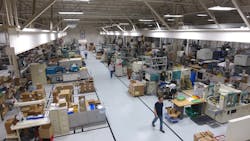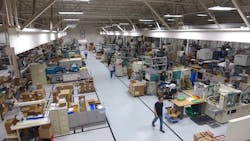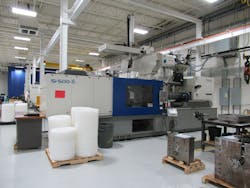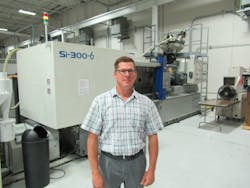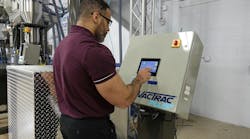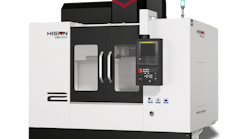“We have a lot of customers with plastic parts that need subsequent machining,” said John Kunkle, Garner’s sales manager. “We do a lot of military, aerospace and defense parts, some fairly high-end, that we injection mold and then machine the final details because of the required tolerances.
“The fact that we can do all that under one roof makes us more competitive, and it maintains confidentiality for our military and aerospace customers,” he said.
Garner has 28 injection molding machines with clamping forces ranging from 35 tons to 500 tons. It specializes in small to medium-sized plastic parts and short- to medium-run precision machining of metals and plastics.
A good amount of the company’s injection molding is insert molding, overmolding and other difficult processes, such as making optical-quality plastics.
Garner can machine a metal component and then insert mold it into a part. “It sets us apart from our competitors,” Kunkle said.
“We have learned a lot about how to do it,” Kunkle said. “It is more than just making a plastic part, then slapping it in the mold and molding over it. There are a lot of things with injection pressures, supporting the first shot, things like that that we have learned. And there are ways we have been able to reduce some cycle times, which also makes us more competitive.”
Garner Industries is privately owned and does not publish annual sales figures, but overall revenue is $30 million to $40 million a year, with about 50 percent of revenue coming from BinMaster products, 40 percent from custom injection molding and the rest from machining.
About 10 percent of Garner’s molding business is for BinMaster products.
Molding machines exclusively from Niigata were Garner’s mainstay for many years, but, in 2015, the company started switching to all-electric Toyo Si series presses. It now has three 500-ton Toyo presses, three 300 tonners and two 150 tonners. The 20 older Niigatas have clamping forces ranging from 35 tons to 385 tons.
The switch to Japanese-made Toyo molding machines started after Garner hired a molding department manager who had worked for a multi-national pharmaceutical molder that used Toyo presses. That company had already completed a side-by-side benchmarking test of several press brands, so Garner benefitted from what it had learned.
Kunkle said Toyo provides great technical support and spare parts availability through its distributor, Maruka USA Inc., which is less than a four-hour drive from Lincoln in Lee’s Summit, Mo. “All these things were important in helping us move to Toyos,” Kunkle said. “We have been very happy with the machines and support.”
Other factors Kunkle said Garner technicians have come to appreciate are the resolution of the screen of the Toyo control system and the amount of data available when adjusting the press. “The process capability is better,” he said.
Garner’s most recent press acquisitions were three 500-ton Toyos for a new project, a part that is 24 inches in diameter. Despite satisfaction with the Toyo presses it had already acquired, Garner tested a mold on four different brands of machines.
“Most of the machinery suppliers said we need at least an 800-ton to 1,000-ton press for a part that big,” Kunkle said. The test found that it could run on a 500-ton Toyo.
Kunkle said he thinks the confidence Garner has in its Toyo presses is a competitive advantage, as well.
Kunkle said that Garner’s molding department manager has complete faith in Toyo’s mold-protection system to prevent damage to the mold. “He’s very confident in that, and he has instilled confidence in the technicians.”
“He knows he has a lot better capability for ejecting on the fly. There are a lot of good machines out there, but, if you are confident in something, the mindset is already there that you are going to be able to do well with that machine. If you have confidence in your equipment, you are more likely to push your equipment.”
Nine of Garner’s older Niigata presses are more than 20 years old. “Most of the machinery we have bought has been for additional capacity,” Kunkle said.
“Our older electric machines are still running because it is difficult to justify replacing them when they are functioning well and still producing good parts,” he said. Garner has purchased only electric molding machines since 2003.
On the plant floor, Garner groups presses by size — 18 presses with clamping forces up to 300 tons, seven with 300 to 400 tons of force and three 500-ton machines — in a new 40,000 square-foot addition built to accommodate recent expansion.
The company has a two-station, vertical 35-ton Niigata press that is more than 20 years old. Garner uses it to manufacture about 1.5 million cranks with attached worm gears per year.
Space is available for additional molding machines.
The company has three outdoor resin silos that each have 100,000 pounds of capacity and two surge bins indoors that hold 3,000 gallons each. They are equipped with BinMaster’s continuous level sensors that let Garner, as well as its customers, view inventory levels. Resin hoppers inside the molding plant are equipped with BinMaster’s vibrating sensors to monitor resin levels and to trigger the pneumatic conveying system to move resin to the presses.
Molding machines not connected to the pneumatic conveying system are fed from gaylords.
Garner maintains about 280 active molds and makes about 20 mold changes per day.
Two full-time toolmakers perform tool modifications, repairs and maintenance.
The company manages mold-building projects for customers and sources molds from the U.S., China and, more recently, Vietnam. Kunkle is currently on a two-year assignment in Vietnam to identify and work with mold-building shops capable of meeting Garner’s standards.
“I started sourcing in China eight years ago, but China’s pricing has gotten significantly higher,” Kunkle said. “Now we are moving to production in Vietnam, where there are substantially lower costs but still good quality. They are on a learning curve.”
For robots, Garner uses Yushin and Wittmann Battenfeld products. There are also some parts-handling robots from AEC.
Blenders are from Conair, and dryers are from Universal Dynamics and Matsui.
For quality control, there is a fully automatic Zeiss CMM, a Sprint optical CMM with a touch probe and a Tesa CMM.
Garner uses Microsoft Dynamics NAV for its plant-wide enterprise resource planning software. It uses PlannerOne software for production planning and scheduling.
Regrind is generally processed beside the press or in a closed-loop system nearby.
The plant runs 24/7. Kunkle said that worker retention has improved in the past couple of years because of new programs, such as a greater pay differential between the second and third shifts, good environmental conditions in the plant and an improved lunchroom. In addition, the company offers classes in English as a second language at no charge in the plant, either before or after a shift.
“We have several different ethnic groups represented in the plant, and most of our new employees come from referrals of people in their neighborhoods,” Kunkle said. Referrals are rewarded with a $500 bonus.
Ron Shinn, editor
Contact:
Garner Industries Inc., 402-434-9100, www.garnerindustries.com
Just the Facts
COMPANY: Garner Industries Inc.
LOCATION: Lincoln, Neb.
FOUNDED: 1953
PRODUCTS/PROCESSES: BinMaster inventory-control equipment; custom injection molding; machining
EMPLOYEES: Employees: 140 total, 80 in injection molding
PLANT SIZE: 140,000 square feet; 75,000 square feet dedicated to injection molding
ANNUAL SALES: $30 million to $40 million
